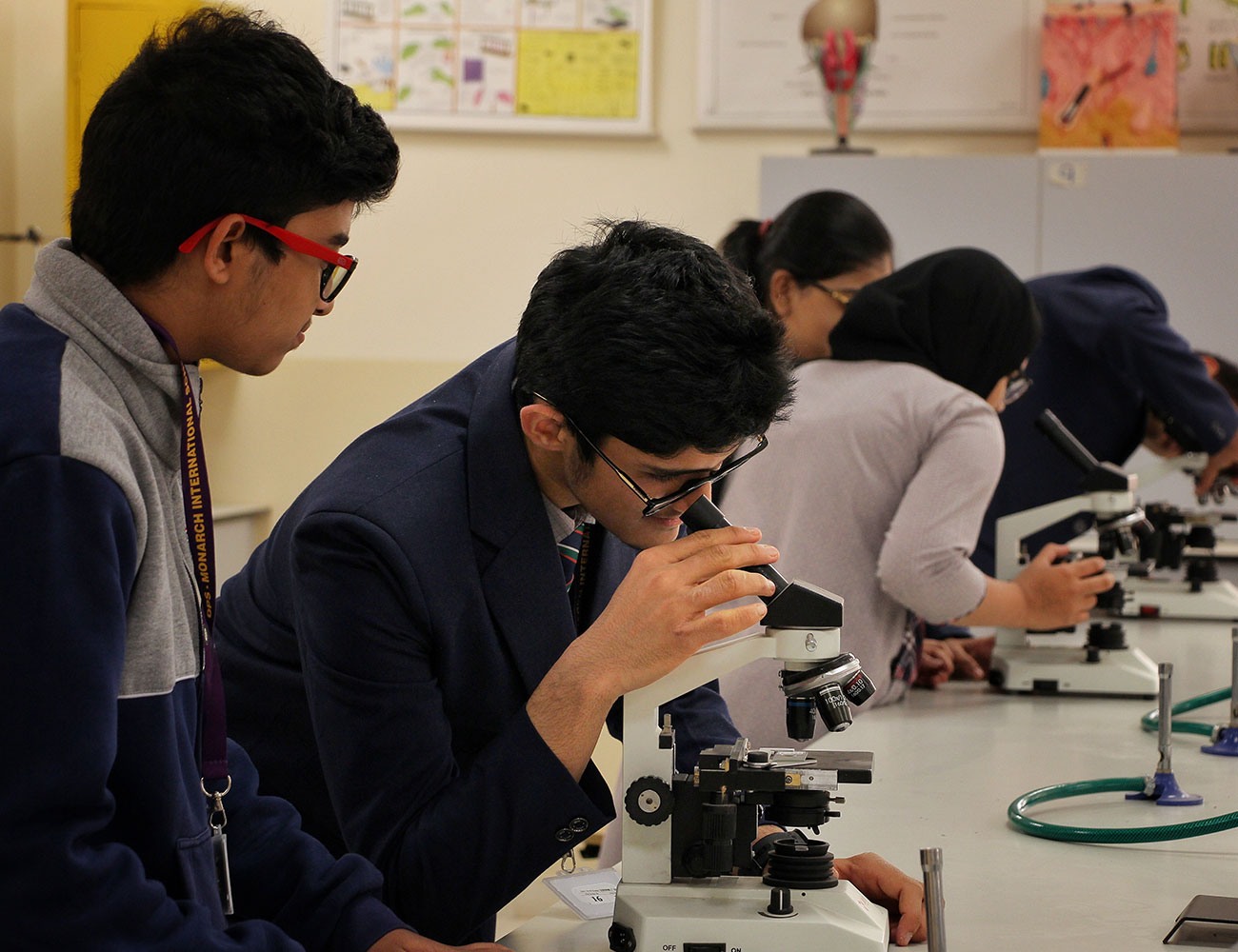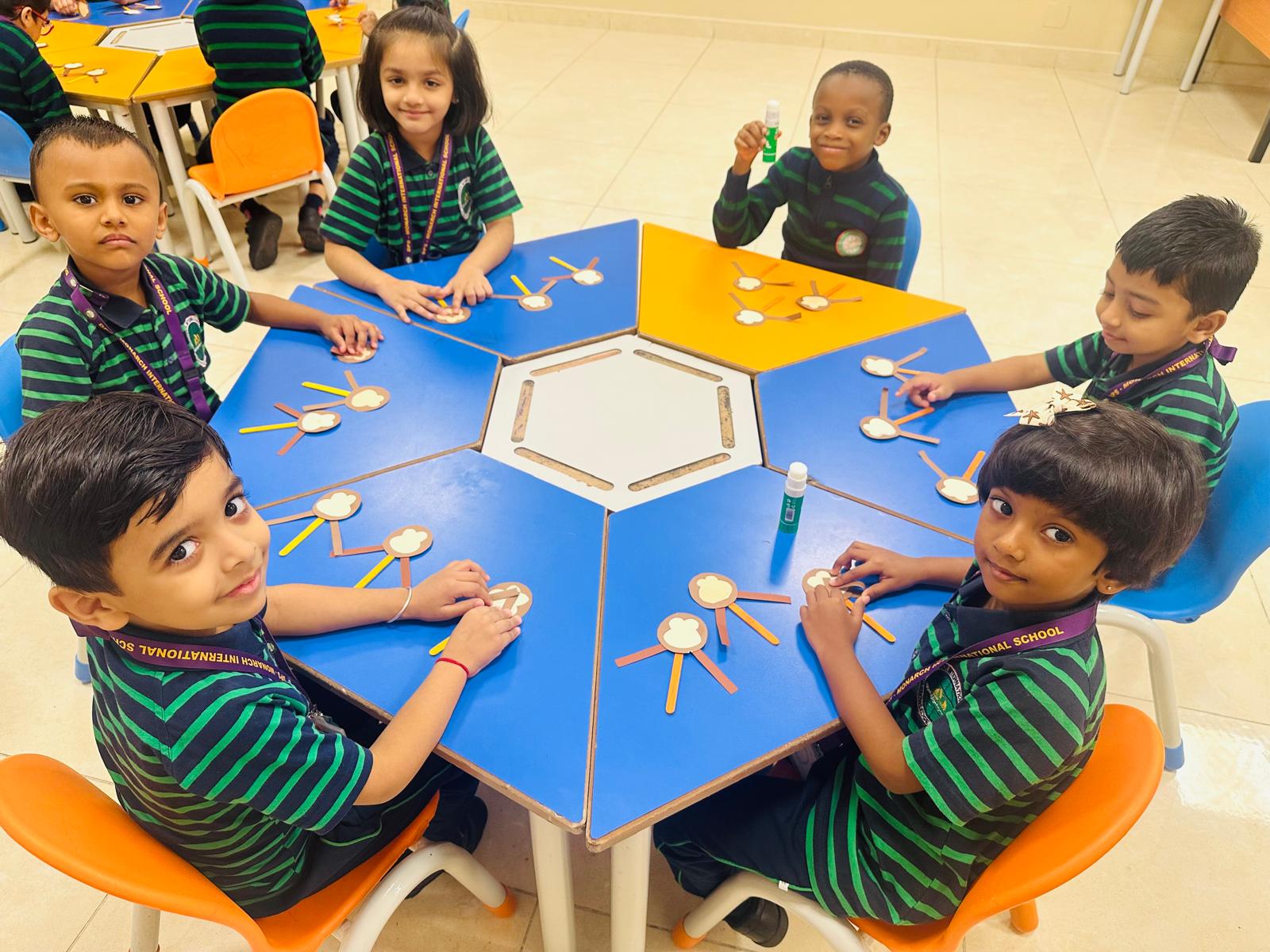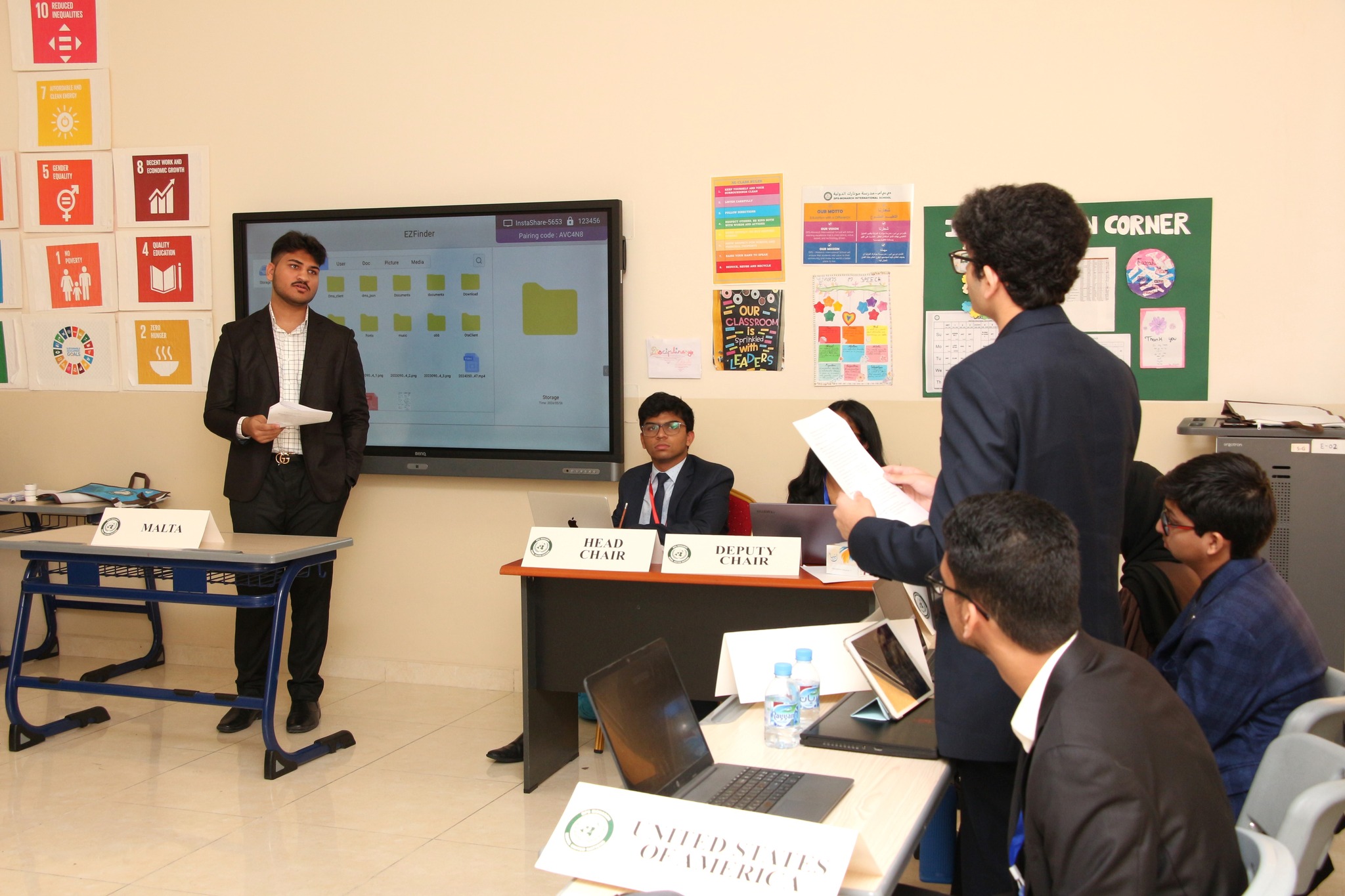
Kindergarten Curriculum
We recognize and honor the early childhood period as pivotal in building a foundation for the educational life of our students. It is here, where it all starts – growing curiosity and the love of learning! In the MIS Kindergarten program, we:
- Value the home school connection. We see parents as partners, we value their input and the ways in which we can work together to support learning.
- Hire and maintain a highly qualified teaching staff.
- See each child as an individual, thus personalizing the learning experience to tailor to his/her needs.
- Provide a well-rounded program that values the arts, physical education, language learning and intellectual engagement.

Primary School Curriculam
As students move to and through the primary school we introduce them progressively to the world of integrated knowledge, while particularly strengthening their aptitude in the core subjects like English, Mathematics, General Science and EVS.
Grade III to V
As a stimulus for reading and writing, from grade 1 our students are introduced to the study of computers, appreciating that computer literacy is essential in the modern world. We also encourage students in the primary school to do various projects in Environmental Science to create awareness about conservation of natural resources and the need for a clean and healthy environment. They learn to appreciate history, geography and the cultural diversity of the Earth. Students have Physical Training classes to develop their agility and fitness. Art and Music classes in the primary school create an interest and appreciation of these creative forms. The following subjects are offered at lower primary level:
- Mathematics
- English
- EVS
- Islamic Studies (for Muslim Students)
- Moral Science
- Life Skills
- Second Language – French/ Hindi/ Malayalam/Tamil/Arabic/Kanna
- Information and Communication Technology (ICT)
- Physical Education
- Art
The curriculum for Grade 3, 4 and 5 is designed as per CBSE CCE System. The school believes in the system of learning by doing. It is a stimulating and motivating way for students to learn. It strengthens their understanding of a concept by giving them practical, first-hand experience of the concept through various activities and projects.The following subjects are offered at upper primary level:
Middle & Secondary School Curriculum
Our middle and secondary school (Grade VI to IX) curriculum is based on the modern educational approach, which marks a shift from teaching to learning. The focus is on equipping the students with essential skills and giving them confidence to use them effectively in real life situations. Students in Grade VI-X are exposed to and immersed into curriculum that ensures that the students do not see knowledge as compartments but view it as a whole, where each part is significant. The focus is on making learning more meaningful. The pedagogy adopted for classroom learning is ‘Child Centered’ which is interactive, experimental and facilitative. Students study arrange of subjects and there is an equal importance given to each subject.
Grade VI to VIII
- Mathematics
- English
- Science
- Social Studies
- Islamic Studies (for Muslim students)
- Moral Science
- Qatar History
- Second language – French/ Hindi/ Malayalam/Tamil/Arabic/Kannada
- Third Language – French/ Hindi/Kannada Malayalam/Tamil/Urdu/Arabic/Telugu/Sanskrit
- Computer Science
- Physical Education
- Art
Grade IX and X
- Mathematics
- English
- Second Language – Hindi/French/Tamil/Malayalam/Arabic
- General Science
- Social Science
- Computer Science
- Qatar History
- Physical Education
Curriculum Areas at Senior Secondary Level
The Senior Secondary School Curriculum under CBSE typically encompasses classes 11 and 12. It aims to provide a holistic education that prepares students for higher education and equips them with essential skills for life.
CBSE is increasingly integrating Competency-Based Pedagogy and Experiential Learning into its curriculum to enhance student engagement and relevance of education. This approach aims to prepare students not just for exams, but for real-world challenges.
The CBSE curriculum for Senior Secondary School is evolving to embrace modern educational practices like competency-based learning and experiential approaches. This shift aims to create well-rounded individuals ready for the complexities of higher education and life beyond school.
Core Subjects: Students can choose from a range of subjects including Science, Mathematics, Social Science, and Languages.
Elective Subjects: Options may include vocational subjects, arts, and commerce, allowing students to tailor their education to their interests.
Assessment: The curriculum focuses on both formative and summative assessments, with a mix of internal assessments and board examinations.
Competency-Based Pedagogy emphasizes developing specific competencies in students, such as critical thinking, problem-solving, and collaboration.
Focus on Skills: Learning is centred around acquiring skills that are applicable in real-world scenarios, rather than rote memorization.

Languages
In the CBSE Senior Secondary School curriculum, students have the option to choose elective languages. These electives provide an opportunity to study languages in greater depth and often include both classical and modern languages. Here we have English as a compulsory to enhance their proficiency in literature, language skills, and critical analysis.
Humanities and Social Sciences
Geography, History, Economics, Home Science, Sociology, Fine Arts, Political Science, and related subjects promote the learning of history and culture, geographical environment, global institutions, constitutional values and norms, politics, economy, interpersonal and societal interactions, civic responsibilities and the interplay of all these. Learners appreciate and value every human’s right to feel respected and safe, and, in this regard, also understand their Fundamental Rights and Duties and behave responsibly. Learners learn to be tolerant and empathetic towards others through the study of these subjects.
Sciences
Biology, Chemistry, Physics, Computer Science, and Informatics Practices help in making students perceptive about matter and energy, nature, the environment, technological breakthroughs in science. The focus is on knowledge and skills to develop a scientific attitude and to use and apply such knowledge for improving the quality of life. The Curriculum promotes the ability to engage with science related issues, and with the ideas of science, as a reflective citizen by being able to explain phenomena scientifically, evaluate and design 4 scientific enquiry, and interpret data and evidence scientifically. Students understand the importance of to apply scientific knowledge in the context of real-life situations and gain competencies that enable them to participate effectively and productively in life.
Mathematics
includes acquiring the concepts related to numbers, operations, computation, measurement, geometry, probability and statistics, the skill to calculate and organize and the ability to apply this knowledge and acquired skills in their daily life. It also includes understanding of the principles of reasoning and problem solving. Learners identify, integrate and apply numerical and spatial concepts and techniques. They have clarity of concepts and are able to connect them to the real world. Learners rationalize and reason about pre-defined arrangements, norms and relationships in order to comprehend, decode, validate and develop relevant patterns.
Business and commerce based electives
Business Studies, Accountancy, Entrepreneurship, Economics and related subjects help in gaining understanding about core business disciplines. They understand the concept like, the exchange of items of value or products between persons or companies and the meaning / relevance/ significance of any such exchange of money for a product, service, or information.
Visual, Performing and Creative Arts
Subjects like Dance, Drama, Music, Heritage Crafts, Fine Arts, Sculpture and related subjects aim to help learners cultivate an interest and appreciation for arts and encourage them to enthusiastically participate in related activities, thus, promoting abilities such as imagination, creativity, value arts, and the cultural heritage.
Skill Electives
Help in development of professional competencies, which are analytical, applied and outcome based. Undergoing skills training in schools can help students learn about a trade progressively to create a product and also to become a problem solver in real life.
Health and Physical Education
focuses on holistic development, both mental and physical, understanding the importance of physical fitness, health, well-being and the factors that contribute to them. Focus of this area is on helping learners develop a positive attitude and commitment to lifelong, healthy active living and the capacity to live satisfying, productive lives with the help of health management, indigenous sports, yoga, NCC, self-defense, fitness and lifestyle choices. These learning areas are to be integrated with each other in terms of knowledge, skills (life and livelihood), comprehension, values and attitudes. Learners should get opportunities to think laterally, critically, identify opportunity, challenge their potential and be open to challenges. Learners value and engage in practices that promote physical, cognitive, emotional and social development and wellbeing. This enables learners to connect different areas of knowledge, application and values with their own lives and the world around them. The holistic nature of human learning and knowledge should be brought forth throughout.
General Studies
The purpose of orienting students to General Studies is to develop in them an appreciation for the holistic nature of knowledge. In contemporary times, familiarity with General Studies is indispensable because at the senior school stage there is an element of specialization due to which the students do not get exposed to some vital disciplines/areas of study that are not covered in their specialized field.




